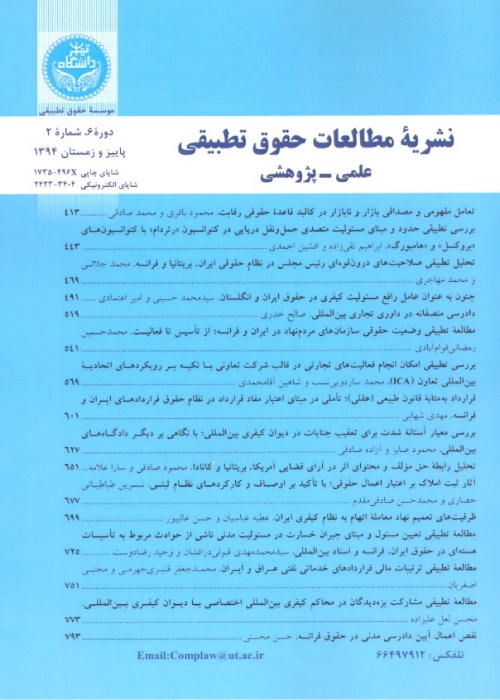A Study of The Entire Obligations Rule in the Common Law System with a Look at Iranian Law
In all legal systems, there is no difference in that the obligor must fulfill his obligation in full and in accordance with the conditions stipulated in the contract, but sometimes for some reasons the obligor cannot fulfill his obligation completely and accurately and the obligation remains incomplete. In the common law system, the first thing that is usually said under the discharge by performance is that the performance must be precise and exact. But is the obligation precisely and exactly implemented in all cases? The answer is definitely no. Because sometimes, for some reasons such as the frustration, breach, etc., the obligor cannot perform the contract completely and accurately, and the contract remains incomplete. In this situation, is the other party obliged to fulfill his obligation in return for incomplete work? In other words, should a person who has performed his obligation incompletely be paid? What to do in this situation? Should we support a person who has fulfilled his obligation incompletely? Or should the other party be supported and not the person who has partially fulfilled his obligation? Or should we accept a way in which the rights of both parties are protected? If we support a person who has fulfilled his obligation incompletely, people will not have enough motivation to complete their contract and can easily break the contract. In addition, the whole contract is desirable for the person, not part of the contract. And if we support the other side and pay nothing to the person who has fulfilled his obligation incompletely, fairness and justice may be violated, Because the obligor has performed part of the contract and it is unfair that nothing be paid to him, as we will see in the case of Cutter v Powell. Therefore, a solution must be adopted in which the rights of both parties to the contract are guaranteed. In the common law system, contracts are discharged in various forms, including discharge by performance, discharge by agreement, discharge by breach, discharge by frustration. One of the rules that is usually discussed under the topic of discharge by performance is the entire obligations rule. this rule is one of the oldest rules in the common law system, dating back to 1795 and the Cutter v Powell case. In this case A sailor had contracted to serve on a ship travelling from Jamaica to Liverpool. He was to be paid 30 guineas for the voyage, payable when the ship arrived in Liverpool, but he died during the journey. His widow sued for his wages up until his death, but her claim was unsuccessful. The court held that the contract required entire performance and, as he had not completed performance, she could claim nothing. Most authors have described this rule as a harsh rule. And for this reason, exceptions to this rule have been made over time. Including substantial performance, divisible contracts, voluntary acceptance of partial performance, prevention of performance and tender of performance. Most authors refer to this rule as the entire obligations rule. other titles have also been used for this rule, such as the entire performance rule or the strict rule on performance or the entire contracts rule. There is no rule in Iranian law under this heading. However, issues such as the indivisibility of obligations, the indivisibility of lien, the desired unity and obligation to achieve a certain result are similar to this rule. The response of the common law system to this situation does not fully ensure justice and has flaws that can be seen in the case of Cutter v Powell. Similarly, Iranian law does not provide a comprehensive answer to this situation. Therefore, in this article, a comprehensive solution will be expressed in case of incomplete or partial fulfillment of the obligation.
- حق عضویت دریافتی صرف حمایت از نشریات عضو و نگهداری، تکمیل و توسعه مگیران میشود.
- پرداخت حق اشتراک و دانلود مقالات اجازه بازنشر آن در سایر رسانههای چاپی و دیجیتال را به کاربر نمیدهد.


